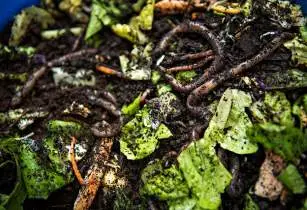A project in Zimbabwe is promoting the use of earthworms to enable the country’s small-scale farmers improve soil fertility
According to Ephraim Whingiri, CEO of Zim Earthworm Farms (ZEF), earthworms eat organic wastes and their faeces that are more potent than ordinary compost are used to improve soil fertility, which in turn boosts crop yields.
“Soil conservation technologies enhance productivity and help farmers realise increased production,” said Whingiri.
Whingiri explained that earthworm technology is cheap and can alleviate poverty, adding that his organisation is training smallholders to breed earthworms as an income-generating activity. During a campaign held in Harare in August, ZEF trained 100 farmers to use earthworm technology.
Tracy Kashanje was one of the 100 smallholder farmers who were trained by ZEF in how to produce organic fertiliser and compost from earthworms. Kashanje and other smallholders were given 60 grams of earthworms after the training to help breed and keep them.
“It is cost-effective as I sell earthworms and also use it as manure. Organic farming has increased my harvest,” Kashanje told SciDev.Net.
Whingiri said that the technology can address the waste management and food security dilemmas in the country. “Earthworms technology is economically viable, sustainable and socially acceptable. Every household has waste from animals, food waste and field waste, which if composted and inoculated with earthworms, can be converted into rich bio-fertiliser,” he explained.
According to Emmanuel Chikwari, acting head of the Chemistry and Soils Research Institute at Zimbabwe’s Ministry of Agriculture, Mechanisation and Irrigation, earthworms degrade wastes faster than conventional systems. He said that unlike chemical fertilisers which are popular in the country, organic manure is not prone to nutrient losses through leeching.
“There is a need to provide appropriate training for farmers so they can know how to handle and manage earthworms,” said Chikwari. He added that the government must increase support for organic farming.





